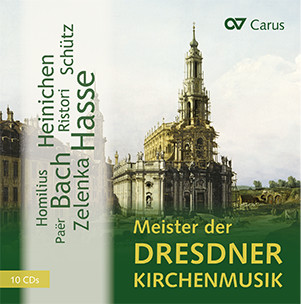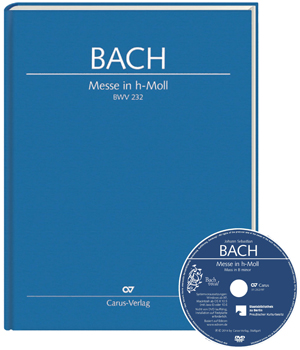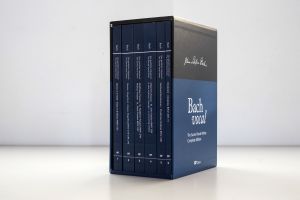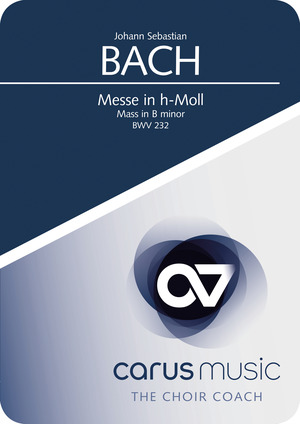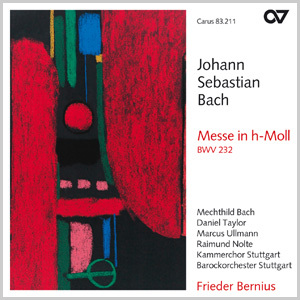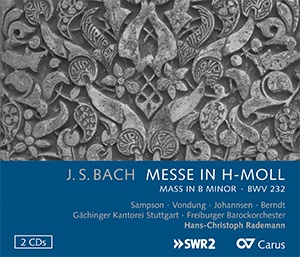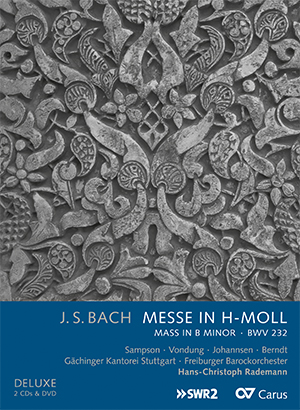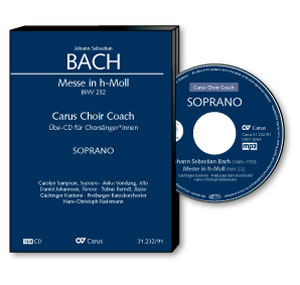
Johann Sebastian Bach Messe en si mineur
BWV 232 (BWV3 232.4)
- Effectif:
- Soli SSATB, Coro SSAATTBB, 2 Fl, 3 Ob (auch Obda), 2 Fg, Cor, 3 Tr, Timp, 2 Vl, Va, Bc
- Chercher les œuvres avec un effectif similaire
- Langue:
- latin
- Durée:
- 100 min
- Niveau de difficulté:
- 1 2 3 4 5
La Messe en si mineur de Bach compte parmi les plus gros défis de la littérature chorale. La partie du chœur est très importante et les mouvements choraux font partie des meilleures compositions de Bach : une représentation de la Messe en si mineur est un événement marquant pour tout choriste. Cependant, elle exige aussi beaucoup du chanteur, tantôt à cause d'une virtuosité extrême, tantôt d'une harmonie complexe. Et la Messe en si mineur de Bach est une œuvre pleine de mystère. Même si les interrogations concernant son origine doivent rester sans réponse, l'édition Carus est un guide fiable pour les questions compliquées de la « bonne » version et offre un texte musical parfaitement cohérent.
Le Carus Choir Coach offre aux choristes une aide unique pour apprendre leur voix au sein de la sonorité du chœur et de l’orchestre. Pour chaque voix, un CD audio ou MP3 et un téléchargement est disponible avec tous les mouvements chantés par le chœur. Le CD se base sur un enregistrement d’interprètes prestigieux, qui ont pour celui-ci utilisé l’édition Urtext de Carus. Chaque mouvement est présenté en trois variantes :
- Version originale
- Coach : la voix sélectionnée est jouée au piano, avec l’enregistrement original en arrière-pla
- Coach en mode ralenti : l’enregistrement comme le coach sont ralentis à environ 70 % du tempo initial, ainsi les passages difficiles peuvent être travaillés efficacement.
Interprètes : Carolyn Sampson (Sopran), Anke Vondung (Alt), Daniel Johannsen (Tenor), Tobias Berndt (Bass) – Gächinger Kantorei Stuttgart, Freiburger Barockorchester Consort – Hans-Christoph Rademann
 Ecouter
(27)
Ecouter
(27)
- Acheter l´œuvre sous forme de CD ou de fichier à télécharger.
- Kyrie eleison I
- Christe eleison
- Kyrie eleison II
- Gloria in excelsis Deo
- Et in terra pax
- Laudamus te
- Gratias agimus tibi
- Domine Deus
- Qui tollis
- Qui sedes
- Quoniam tu solus Sanctus
- Cum Sancto Spiritu
- Credo in unum Deum
- Patrem omnipotentem
- Et in unum Dominum
- Et incarnatus est
- Crucifixus
- Et resurrexit
- Et in Spiritum Sanctum
- Confiteor
- Et exspecto
- Sanctus / Pleni sunt
- Osanna
- Benedictus
- Osanna
- Agnus Dei
- Dona nobis pacem
 S`exercer
S`exercer
-
-
Aides à l'apprentissage voix alto
- Kyrie eleison I (Choir Coach)
- Kyrie eleison II (Choir Coach)
- Gloria in excelsis Deo (Choir Coach)
- Et in terra pax (Choir Coach)
- Gratias agimus tibi (Choir Coach)
- Qui tollis (Choir Coach)
- Cum Sancto Spiritu (Choir Coach)
- Credo in unum Deum (Choir Coach)
- Patrem omnipotentem (Choir Coach)
- Et incarnatus est (Choir Coach)
- Crucifixus (Choir Coach)
- Et resurrexit (Choir Coach)
- Confiteor (Choir Coach)
- Et exspecto (Choir Coach)
- Sanctus / Pleni sunt (Choir Coach, Alto 1)
- Sanctus / Pleni sunt (Choir Coach, Alto 2)
- Sanctus / Pleni sunt (Choir Coach, Alto 1)
- Sanctus / Pleni sunt (Choir Coach, Alto 2)
- Osanna (Choir Coach, Alto 1)
- Osanna (Choir Coach, Alto 2)
- Gloria in excelsis Deo (Choir Coach, Slow mode)
- Et in terra pax (Choir Coach, Slow mode)
- Gratias agimus tibi (Choir Coach, Slow mode)
- Qui tollis (Choir Coach, Slow mode)
- Cum Sancto Spiritu (Choir Coach, Slow mode)
- Credo in unum Deum (Choir Coach, Slow mode)
- Patrem omnipotentem (Choir Coach, Slow mode)
- Et resurrexit (Choir Coach, Slow mode)
- Confiteor (Choir Coach, Slow mode)
- Et exspecto (Choir Coach, Slow mode)
- Sanctus / Pleni sunt (Choir Coach, Slow mode, Alto 1)
- Sanctus / Pleni sunt (Choir Coach, Slow mode, Alto 2)
- Sanctus / Pleni sunt (Choir Coach, Slow mode, Alto 1)
- Sanctus / Pleni sunt (Choir Coach, Slow mode, Alto 2)
- Osanna (Choir Coach, Slow mode, Alto 1)
- Osanna (Choir Coach, Slow mode, Alto 2)
- Dona nobis pacem (Choir Coach, Slow mode)
-
Aides à l'apprentissage voix tenore
- Kyrie eleison I (Choir Coach)
- Kyrie eleison II (Choir Coach)
- Gloria in excelsis Deo (Choir Coach)
- Et in terra pax (Choir Coach)
- Gratias agimus tibi (Choir Coach)
- Qui tollis (Choir Coach)
- Cum Sancto Spiritu (Choir Coach)
- Credo in unum Deum (Choir Coach)
- Patrem omnipotentem (Choir Coach)
- Et incarnatus est (Choir Coach)
- Crucifixus (Choir Coach)
- Et resurrexit (Choir Coach)
- Confiteor (Choir Coach)
- Et exspecto (Choir Coach)
- Sanctus / Pleni sunt (Choir Coach)
- Sanctus / Pleni sunt (Choir Coach)
- Osanna (Choir Coach, Tenore 1)
- Osanna (Choir Coach, Tenore 2)
- Kyrie eleison II (Choir Coach, Slow mode)
- Gloria in excelsis Deo (Choir Coach, Slow mode)
- Et in terra pax (Choir Coach, Slow mode)
- Gratias agimus tibi (Choir Coach, Slow mode)
- Qui tollis (Choir Coach, Slow mode)
- Cum Sancto Spiritu (Choir Coach, Slow mode)
- Credo in unum Deum (Choir Coach, Slow mode)
- Et resurrexit (Choir Coach, Slow mode)
- Confiteor (Choir Coach, Slow mode)
- Et exspecto (Choir Coach, Slow mode)
- Sanctus / Pleni sunt (Choir Coach, Slow mode)
- Sanctus / Pleni sunt (Choir Coach, Slow mode)
- Osanna (Choir Coach, Slow mode, Tenore 1)
- Osanna (Choir Coach, Slow mode, Tenore 2)
-
Aides à l'apprentissage voix basse
- Kyrie eleison I (Choir Coach)
- Kyrie eleison II (Choir Coach)
- Gloria in excelsis Deo (Choir Coach)
- Gratias agimus tibi (Choir Coach)
- Qui tollis (Choir Coach)
- Cum Sancto Spiritu (Choir Coach)
- Credo in unum Deum (Choir Coach)
- Patrem omnipotentem (Choir Coach)
- Et incarnatus est (Choir Coach)
- Crucifixus (Choir Coach)
- Et resurrexit (Choir Coach)
- Confiteor (Choir Coach)
- Et exspecto (Choir Coach)
- Sanctus / Pleni sunt (Choir Coach)
- Sanctus / Pleni sunt (Choir Coach)
- Osanna (Choir Coach, Basse 1)
- Osanna (Choir Coach, Basse 2)
- Dona nobis pacem (Choir Coach)
- Kyrie eleison II (Choir Coach, Slow mode)
- Gloria in excelsis Deo (Choir Coach, Slow mode)
- Et in terra pax (Choir Coach, Slow mode)
- Gratias agimus tibi (Choir Coach, Slow mode)
- Qui tollis (Choir Coach, Slow mode)
- Cum Sancto Spiritu (Choir Coach, Slow mode)
- Credo in unum Deum (Choir Coach, Slow mode)
- Patrem omnipotentem (Choir Coach, Slow mode)
- Et resurrexit (Choir Coach, Slow mode)
- Confiteor (Choir Coach, Slow mode)
- Et exspecto (Choir Coach, Slow mode)
- Sanctus / Pleni sunt (Choir Coach, Slow mode)
- Sanctus / Pleni sunt (Choir Coach, Slow mode)
- Osanna (Choir Coach, Slow mode, Basse 1)
- Osanna (Choir Coach, Slow mode, Basse 2)
- Dona nobis pacem (Choir Coach, Slow mode)
-
Aides à l'apprentissage voix soprano
- Kyrie eleison I (Choir Coach, soprano 1)
- Kyrie eleison I (Choir Coach, soprano 2)
- Kyrie eleison II (Choir Coach)
- Kyrie eleison II (Choir Coach, Slow mode)
- Gloria in excelsis Deo (Choir Coach, soprano 1)
- Gloria in excelsis Deo (Choir Coach, Slow mode, soprano 1)
- Gloria in excelsis Deo (Choir Coach, soprano 2)
- Gloria in excelsis Deo (Choir Coach, Slow mode, soprano 2)
- Et in terra pax (Choir Coach, soprano 1)
- Et in terra pax (Choir Coach, Slow mode, soprano 1)
- Et in terra pax (Choir Coach, soprano 2)
- Et in terra pax (Choir Coach, Slow mode, soprano 2)
- Gratias agimus tibi (Choir Coach)
- Gratias agimus tibi (Choir Coach, Slow mode)
- Qui tollis (Choir Coach)
- Qui tollis (Choir Coach, Slow mode)
- Cum Sancto Spiritu (Choir Coach, soprano 1)
- Cum Sancto Spiritu (Choir Coach, Slow mode, soprano 1)
- Cum Sancto Spiritu (Choir Coach, soprano 2)
- Cum Sancto Spiritu (Choir Coach, Slow mode, soprano 2)
- Credo in unum Deum (Choir Coach, soprano 1)
- Credo in unum Deum (Choir Coach, Slow mode, soprano 1)
- Credo in unum Deum (Choir Coach, soprano 2)
- Credo in unum Deum (Choir Coach, Slow mode, soprano 2)
- Patrem omnipotentem (Choir Coach)
- Patrem omnipotentem (Choir Coach, Slow mode)
- Et incarnatus est (Choir Coach, soprano 1)
- Et incarnatus est (Choir Coach, soprano 2)
- Crucifixus (Choir Coach)
- Et resurrexit (Choir Coach, soprano 1)
- Et resurrexit (Choir Coach, Slow mode, soprano 1)
- Et resurrexit (Choir Coach, soprano 2)
- Et resurrexit (Choir Coach, Slow mode, soprano 2)
- Confiteor (Choir Coach, soprano 1)
- Confiteor (Choir Coach, Slow mode, soprano 1)
- Confiteor (Choir Coach, soprano 2)
- Confiteor (Choir Coach, Slow mode, soprano 2)
- Et exspecto (Choir Coach, soprano 1)
- Et exspecto (Choir Coach, Slow mode, soprano 1)
- Et exspecto (Choir Coach, soprano 2)
- Et exspecto (Choir Coach, Slow mode, soprano 2)
- Sanctus / Pleni sunt (Choir Coach, soprano 1)
- Sanctus / Pleni sunt (Choir Coach, Slow mode, soprano 1)
- Sanctus / Pleni sunt (Choir Coach, soprano 2)
- Sanctus / Pleni sunt (Choir Coach, Slow mode, soprano 2)
- Sanctus / Pleni sunt (Choir Coach, soprano 1)
- Sanctus / Pleni sunt (Choir Coach, Slow mode, soprano 1)
- Sanctus / Pleni sunt (Choir Coach, soprano 2)
- Sanctus / Pleni sunt (Choir Coach, Slow mode, soprano 2)
- Osanna (Choir Coach, soprano 1)
- Osanna (Choir Coach, Slow mode, soprano 1)
- Osanna (Choir Coach, soprano 2)
- Osanna (Choir Coach, Slow mode, soprano 2)
- Dona nobis pacem (Choir Coach)
- Dona nobis pacem (Choir Coach, Slow mode)
 Compléments
Compléments
- Acheter des compléments au format téléchargement.
-
 texte (pas de notes) & licence d'impression, fichier html, Paroles, traduction en anglaisfichier html, Paroles, traduction en anglais (Extrait)
texte (pas de notes) & licence d'impression, fichier html, Paroles, traduction en anglaisfichier html, Paroles, traduction en anglais (Extrait)I. Missa
Kyrie
1. Coro
Lord, have mercy on us.
2. Soprano & Alto
Christ, have mercy on us.
3. Coro
Lord, have mercy on us.
Gloria
4a. Coro
Glory be to God on high.
4b. Coro
And on earth peace to men of good will.
5. Soprano
We praise thee; we bless thee; we adore thee; we glorify thee.
6. Coro
We give thee thanks for thy great glory.
7a. Soprano & Tenore
Lord God, heavenly King, God the almighty Father.
O Lord, the only-begotten Son, Jesus Christ,
O Lord God, Lamb of God, Son of the Father.7b. Coro
... -
 texte (pas de notes) & licence d'impression, fichier html, Paroles, traduction allemandefichier html, Paroles, traduction allemande (Extrait)
texte (pas de notes) & licence d'impression, fichier html, Paroles, traduction allemandefichier html, Paroles, traduction allemande (Extrait)I. Missa
Kyrie
1. Coro
Herr, erbarme dich unser.2. Soprano & Alto
Christus, erbarme dich unser.3. Coro
Herr, erbarme dich unser.Gloria
4a. Coro
Ehre sei Gott in der Höhe.4b. Coro
Und Friede auf Erden den Menschen, die guten Willens sind.5. Soprano
Wir loben dich, wir preisen dich,
wir beten dich an, wir rühmen dich.6. Coro
Wir danken dir,... -
 texte (pas de notes) & licence d'impression, fichier html, Paroles, originalfichier html, Paroles, original (Extrait)
texte (pas de notes) & licence d'impression, fichier html, Paroles, originalfichier html, Paroles, original (Extrait)I. Missa
Kyrie
1. Coro
Kyrie eleison.2. Soprano & Alto
Christe eleison.3. Coro
Kyrie eleison.Gloria
4a. Coro
Gloria in excelsis Deo.4b. Coro
Et in terra pax hominibus bonae voluntatis.5. Soprano
Laudamus te, benedicimus te, adoramus te, glorificamus te.6. Coro
Gratias agimus tibi propter magnam gloriam tuam.7a. Soprano & Tenore
Domine Deus, Rex caelestis,
... -
 texte (pas de notes) & licence d'impression, fichier html, Texte introductif, en anglaisfichier html, Texte introductif, en anglais (Extrait)
texte (pas de notes) & licence d'impression, fichier html, Texte introductif, en anglaisfichier html, Texte introductif, en anglais (Extrait)Text from the CD Carus 83.314
Ulrich Leisinger
Translation (abridged): J. Bradford Robinson, David KosvinerThe idea of an autonomous work of art that has governed discussions of art ever since the nineteenth century was alien to Johann Sebastian Bach and his contemporaries. Almost all of Bach’s compositions were written for external occasions, whether in fulfillment of his duties as concert- and chapel-master or to meet the needs of his lessons. Remarkably, however, he returned to some of his works again and again over long periods of time. Some of the alterations he made went far beyond what was necessary for a simple revival, suggesting that he was intent on putting these works into a “definitive”shape.
The circumstances surrounding the Mass in B minor BWV 232, to use the name we give it today (Carl Philipp Emanuel Bach called it “the great Catholic Mass” to distinguish it from his father’s Kyrie-Gloria Masses, BWV 233–236), are especially complex. Its genesis was spread over a period of more than fifteen years, and the work, though finished at the time of Bach’s death (on 28 July 1750), still awaited a final revision to put it into performable condition. Despite
... -
 texte (pas de notes) & licence d'impression, fichier html, Texte introductif, en allemandfichier html, Texte introductif, en allemand (Extrait)
texte (pas de notes) & licence d'impression, fichier html, Texte introductif, en allemandfichier html, Texte introductif, en allemand (Extrait)Booklet-Text der CD Carus 83.314
Ulrich Leisinger
Die Idee des autonomen Kunstwerks, die die Diskussion von Kunst seit dem 19. Jahrhundert bestimmt, war Johann Sebastian Bach und seinen Zeitgenossen fremd. Nahezu alle Kompositionen Bachs sind auf äußere Veranlassung hin entstanden, sei es aus seinen Dienstpflichten als Konzert- und Kapellmeister oder aus der Notwendigkeit des Unterrichts heraus. Bemerkenswert ist aber, dass er sich mit einigen seiner Werke über größere Zeiträume immer wieder auseinandergesetzt hat. Die Eingriffe, die er dabei vornahm, gingen zum Teil deutlich über das hinaus, was für eine bloße Wiederaufführung notwendig gewesen wäre, und lassen ein Bemühen erkennen, eine „endgültige“ Werkgestalt zu schaffen.
Besonders komplex sind die Verhältnisse bei der h-Moll-Messe BWV 232, wie wir sie heute nennen (Carl Philipp Emanuel Bach nannte sie in Abgrenzung von den Kyrie-Gloria-Messen BWV 233–236 „die große catholische Messe“), denn ihre Entstehungsgeschichte erstreckt sich über einen Zeitraum von mehr als 15 Jahren, und das Werk war zum Zeitpunkt des Todes von Johann Sebastian Bach am 28. Juli 1750 zwar
...
Sommaire
-
Compositeur
Johann Sebastian Bach
| 1685-1750Jean Sébastien Bach compte parmi les compositeurs essentiels de l'histoire de la musique occidentale. Il faisait partie d'une grande dynastie de musiciens, dont furent originaires nombre de musiciens municipaux et d'organistes dans les régions de Thuringe et de Saxe.
Bach vocal
Depuis la fondation des Éditions Carus en 1972, la publication des oeuvres de Johann Sebastian Bach revêt une importance particulière. En 2017, année du 500e anniversaire de la Réforme, nous avons clôturé le projet Bach vocal. L'intégralité de la musique vocale sacrée de Bach est désormais disponible en éditions modernes des textes originaux, matériel d'exécution compris. Une édition globale de toutes les partitions dans un coffret de grande qualité est aussi proposée. Plus d'information sur la personne
-
L'auteur
Anke Vondung
Anke Vondung a étudié le chant auprès de Rudolf Piernay à Mannheim. Elle a remporté de nombreux prix lors de concours internationaux (Concours de la musique ARD 1998, Concours fédéral de chant dans la discipline concert 1998, Concours Mendelssohn Bartholdy 1999). En dehors de l’opéra, Anke Vondung se consacre au concert et au lied. Elle a travaillé avec des chefs d’orchestre tels que Helmuth Rilling, Sir Roger Norrington, Philippe Herreweghe, Kent Nagano, Ivàn Fischer, Armin Jordan, Manfred Honeck, Peter Schreier, Dietrich Fischer-Dieskau, Fabio Luisi, René Jacobs, Enoch zu Guttenberg. Des tournées de concerts l’ont emmenée dans presque tous les pays d’Europe, ainsi qu’en Amérique du Nord et du Sud. Plus d'information sur la personne
-
Chœur
Gächinger Kantorei Stuttgart
Since August 2013, the Gächinger Kantorei Stuttgart has been under the artistic direction of Hans-Christoph Rademann, the director of the Internationale Bachakademie Stuttgart. Under the patronage of the Bachakademie, the choir plays a decisive role in a wide range of concerts, guest performances and recordings for both radio and CD. The center of the choir’s activities consists, in addition to its manifold activities in the MUSI KFEST UTT GART , of a large concert series with oratorio programs ranging from Schütz to commissioned contemporary works. The interpretation of vocal works by Johann Sebastian Bach has always been a special focus of the choir. The Gächinger Kantorei Stuttgart, which is named after a small village in the Swabian Alb and was founded by Helmuth Rilling in 1954, has ranked as one of the outstanding concert choirs of the world for decades. In addition to regular performances with its partner ensemble, the Bach-Collegium Stuttgart, the choir frequently works together with orchestras such as the Vienna Philharmonic, the New York Philharmonic and the Israel Philharmonic. It also has a particularly close relationship with the Stuttgart Radio Symphony Orchestra of the SWR. The choir is regularly conducted by guest conductors such as Masaaki Suzuki, Krzysztof Penderecki, Alexander Liebreich and Sir Roger Norrington. Guest performances have led the ensemble to, among others, China and Latin America, as well as to the large festivals Salzburg, Lucerne, Prague, New York, Paris, London, Vienna and Seoul. The choir has recorded hundreds of CDs which include Bach’s complete vocal works, diverse 18th century oratorios as well as several world premieres including works by Penderecki, Pärt and Rihm. Plus d'information sur la personne
-
Orchestre
Freiburger Barockorchester Consort
-
Chef d'orchestre
Hans-Christoph Rademann
| 1965Conductor Hans-Christoph Rademann is an immensely versatile artist with a broad repertoire who devotes himself with equal passion and expertise both to the performance and rediscovery of early music and to the first performances and cultivation of Contemporary Music. Born in Dresden and raised in the Erzgebirge mountains, he was influenced at an early age by the great Central German kantorial and musical tradition. He was a student at the traditional Kreuzgymnasium, a member of the famous Kreuzchor, and studied choral and orchestral conducting at the Carl Maria von Weber University of Music in Dresden. During his studies, he founded the Dresdner Kammerchor and formed it into a top international choir which is still under his direction today. Since 2013, Hans-Christoph Rademann has been the academy director of the International Bach Academy Stuttgart. He regularly collaborates with leading choirs and ensembles of the international music scene. From 1999 to 2004 he was chief conductor of the NDR Choir and from 2007 to 2015 chief conductor of the RIAS Chamber Choir. Guest conducting engagements have led and continue to lead him to the Nederlandse Bachvereniging, the Collegium Vocale Gent, the Akademie für Alte Musik, the Freiburger Barockorchester, the Deutsche Radiophilharmonie Saarbrücken Kaiserslautern, the Sinfonieorchester Basel, the Orchestre Philharmonique de Luxembourg, among others. Hans-Christoph Rademann has been awarded prizes and honors for his artistic work, including the Johann Walter Plaque of the Saxon Music Council (2014), the Saxon Constitutional Medal (2008), the Sponsorship Prize as well as the Art Prize of the state capital Dresden (1994 and 2014 respectively). He received the Preis der Deutschen Schallplattenkritik several times for his numerous CD recordings (most recently in 2016), as well as the Grand Prix du Disque (2002), the Diapason d’Or (2006 & 2011), the CHOC de l’année 2011 and the Best Baroque Vocal Award 2014. In 2016 he was awarded the European Church Music Prize of the city of Schwäbisch Gmünd. His exemplary interpretation and recording of the complete works of Heinrich Schütz with the Dresdner Kammerchor in the Stuttgart Carus-Verlag, which was completed in 2019, was awarded the newly endowed Heinrich Schütz Prize as well as the OPUS KLASSIK 2020 in the same year. Hans-Christoph Rademann is professor of choral conducting at the Carl Maria von Weber University of Music in Dresden. He is also artistic director of the Musikfest Erzgebirge, ambassador of the Erzgebirge and patron of the Christian Hospice Service Dresden. Plus d'information sur la personne
-
Solist - soprano
Carolyn Sampson
Equally at home on the concert and opera stages, Carolyn Sampson has enjoyed notable successes all over the world. In addition to engagements with, among others, the English National Opera, the Glyndebourne Festival, the Boston Early Music Festival, the Opéra de Paris, the Opéra de Lille, the Opéra de Montpellier as well as the Opéra National du Rhin, she has sung concerts, among others at the BBC Proms. In Europe her many appearances have included concerts with the Royal Concertgebouw Orchestra, The English Concert, Freiburg Baroque Orchestra, Symphony Orchestra of the Bayerischer Rundfunk, WDR Symphony Orchestra, Vienna Philharmonic, Orchestra dell’Accademia Nazionale di Santa Cecilia, and the Leipzig Gewandhaus Orchestra. In the US Carolyn Sampson has featured as soloist with San Francisco Symphony, Detroit Symphony Orchestra, St Paul Chamber Orchestra and Philadelphia Orchestra. Her many recordings include a highly-acclaimed CD of Stravinsky’s Les Noces and Mass. Her recording of Purcell songs was selected as Editor’s Choice in the December 2007 issue of Gramophone Magazine, as was her first recital CD, Fleurs, in May 2015. Plus d'information sur la personne
-
Solist - ténor
Daniel Johannsen
The Austrian tenor Daniel Johannsen is one of the most sought-after Evangelists and Bach interpreters of his generation. After studying church music, he studied singing with Margit Klaushofer and Robert Holl in Vienna; he participated in master classes with Dietrich Fischer-Dieskau, Nicolai Gedda as well as Christa Ludwig, and he has been awarded prizes in the Bach, Schumann, Mozart, Hilde Zadek und Wigmore Hall competitions. Since his debut in 1998, he has performed as a concert, lied and opera singer – with works from all periods – in the large music centers of Europe, North America, Japan and the Middle East. Daniel Johannsen has performed at numerous festivals (Styriarte Graz, Salzburger Festspiele, Israel Festival, La Folle Journée, Bachfest Leipzig); he has performed under the direction of notable conductors such as Sir Neville Marriner, Trevor Pinnock, Bertrand de Billy and Enoch zu Guttenberg. Lied recitals form the main focus of his activity, and he has collaborated with pianists such as Graham Johnson, Charles Spencer und Helmut Deutsch. Numerous CDs, some of which have been awarded prizes, as well radio and television recordings attest to his artistic activities. Plus d'information sur la personne
-
Solist - basse
Tobias Berndt
Tobias Berndt began his musical education in the Dresden Kreuzchor. He studied with Christian Polster in Leipzig and continued his training with Rudolf Piernay in Mannheim. He also studied with Dietrich Fischer-Dieskau and Thomas Quasthoff. He was a laureate in numerous renowned singing competitions, winning – among others – the International Das Lied Competition in Berlin, the International Brahms Competition and the Cantilena Singing Competition. Tobias Berndt has also established himself abroad as an opera and concert singer. He has collaborated with conductors such as Philippe Herreweghe, Helmuth Rilling, Frieder Bernius, Teodor Currentzis, Marcus Creed, Hans-Christoph Rademann, Andrea Marcon, Marek Janowski and Sir Roger Norrington and has performed at the Berliner Philharmonie, the Tonhalle in Zurich, the Concertgebouw Amsterdam, the Leipzig Gewandhaus, the Tchaikovsky Concert Hall in Moscow, the Teatro Colon in Buenos Aires and at Lincoln Center in New York. He has also performed at important festivals such as the Prague Spring, the Rheingau Musik Festival, the Händel Festivals in Göttingen und Halle, the Bachfest Leipzig, the Oregon Bach Festival and the International Music Festival in Peking. An extensive discography attests to his versatile artistic activities. Plus d'information sur la personne
Les évaluations sur notre site web ne peuvent être effectuées que par des clients disposant d'un compte d'utilisateur enregistré. Il n'est pas vérifié si les produits évalués ont été effectivement achetés.
Questions fréquentes sur l'œuvre
 Il n'y a pas encore de questions et réponses concernant cette œuvre ou vous n'avez pas trouvé la réponse à votre question sur l'œuvre ? Cliquez ici et envoyez votre question spécifique à notre service clients.
Il n'y a pas encore de questions et réponses concernant cette œuvre ou vous n'avez pas trouvé la réponse à votre question sur l'œuvre ? Cliquez ici et envoyez votre question spécifique à notre service clients.


